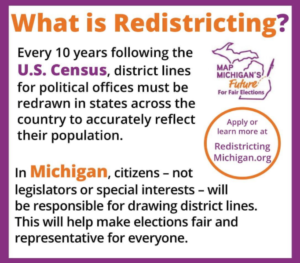By Coner Segren
Potential Michigan redistricting losses based on Census-2020 numbers, establishment of a new urban institute dedicated to social equity at the UM – Flint, a proposal to study a flat rate for water in the City of Flint, and the Genesee County Land Bank’s Clean and Green program were among topics discussed at the latest Flint Neighborhoods United (FNU) meeting.
FNU still holds its monthly meetings by Zoom. The next meeting is scheduled for 9:30 to 11:30 a.m. Saturday, June 5. The Zoom link can be found on the FNU website or Facebook page.
Michigan prepares for upcoming redistricting
According to the 2020 Census, Michigan is expected to lose a congressional seat in 2022 due to a population decrease. With the 2020 Census completed, Michigan is set to begin the process of redistricting or redrawing of congressional districts. The redrawing will be crucial to deciding which party controls the state legislature and who the state sends to Washington, D.C., according to several spokespeople addressing the issue at the FNU meeting.
This round of redistricting will be the first since the passage in 2018 of Proposal 2, the ballot initiative which outlawed partisan gerrymandering statewide. According to the new law, congressional districts will be drawn by a new Independent Citizens Redistricting Commission (ICRC). The commission is bipartisan and follows strict criteria for drawing lines to ensure fairness.

(Photo source: michigan.gov/MICRC)
In the past, congressional lines were drawn by politicians themselves, with no guidelines preventing them from drawing them to favor certain political parties and incumbents. According to voting rights and community advocacy groups like Voters Not Politics and Communities First, this essentially amounted to politicians picking their voters instead of the other way around.
“[Gerrymandering] skews election results, and doing this makes political races less competitive, it hurts communities of color, and it thwarts the will of the voters and so this leads American voters to not have their voices heard,” said Essence Wilson, co-founder of Communities First, Inc.
The ICRC aims to fix that by having a commission made up of 13 members, 4 Democrats, 4 Republicans, and 5 members who don’t affiliate with either party, Wilson explained. These commissioners must follow strict guidelines on how they draw districts, including criteria such as no district favoring any political party, no district favoring incumbent politicians or certain candidates, and all districts representing the state’s diverse population and “communities of interest,” — groups that share an ethnic, economic, or cultural bond.

(Photo source: michigan.gov/MICRC)
“For instance, Otisville might be connected to Columbiaville because they’re in the same school district, even though they’re in different counties,” explained Rick Sadler, a geographer for Michigan State University’s Division of Public Health and a consultant for Voters not Politics. “A ‘community of interest’ captures groups that are similar to each other, but that don’t follow political boundaries. That’s one of the goals of this redistricting.”
For those with more questions or concerns with redistricting, Community First, Inc. can be contacted at redistricting@communitiesfirstinc.org
Communities First also has scheduled a public hearing on the issue for 6 p.m. June 1 at the Dort Federal Credit Union Event Center.
U of M-Flint launches new urban institute dedicated to social equity
University of Michigan-Flint’s new Urban Institute for Racial, Economic, and Environmental Justice is now fully operational, according to Jan Furman, executive director of the new unit and an emeritus professor of English. The Institute, launched in November 2020, is intended to help interdisciplinary, community-focused research projects find funding and media promotion, with a focus on supporting and promoting equity.
“Our mission is to interrupt what I think is a prevailing deficit narrative of our city, which too often emphasizes what’s wrong with Flint and not all the great work that’s happening,” Furman said. “The institute’s work is harnessing the expertise that we have at the university, identifying community partners, and securing funding for projects and studies.”

(Photo source: University of Michigan-Flint’s new Urban Institute for Racial, Economic, and Environmental Justice website.)
According to Furman, the focus of the Institute is on youth-oriented projects, designed to provide resources for young people from birth to college age. One such project at UM-Flint is “Family, Friends, and Neighbors,” a group of child-care providers who advocate for changes to state-policy that sideline children from marginalized communities.
Above all, the Urban Institute will be focused on community engagement. According to Furman, all Institute proposals will be a collaboration between university faculty and community partners.
“We are committed to a continuing collaboration with community partners and foundations, and then ultimately finding ways to disseminate our work as one way of disrupting reductive stories about who we are, at the university and in our city,” she said.

Serpentine shaped wall in UM-Flint Recreation Center. (Photo by Tom Travis)
The Urban Institute can be contacted at urban-institute@umich.edu, Jan Furman, executive director, can be reached at jfurman@umich.edu, and Thomas Bell, managing director, can be reached at thomn@umich.edu.
Mayor Neeley says Flint needs to stabilize water costs
Mayor Sheldon Neeley told FNU participants he hopes to soon conduct a study to determine a flat rate for water in the City of Flint. Neeley said the City had been unable to conduct this study due to a moratorium on water shut-offs which ended March 31, as well as habitual non-payment by certain commercial businesses.

Flint Water Plant located on N. Dort Hwy., Flint. (Photo by Tom Travis)
“The City of Flint is going after those habitual non-payers in the commercial area,” Neeley said. “Everybody has to pay their bill and their fair share for us to level off so we can get a sense of what a flat rate would look like.”
Despite the moratorium on water shut-offs ending in March, Neeley reiterated he refuses to shut off water for residential water users because of non-payment. Neeley said the funds for water in the City of Flint have stabilized with money flowing from the water sewer fund into the general fund.
Land Bank’s Clean & Green Program hits record participation
The 2021 Clean & Green program, which cleans and maintains vacant properties owned by the Genesee County Land Bank, officially began on April 28. This year 69 community groups are participating in the program, a record high, according to Raynetta Speed, community outreach coordinator for the Land Bank.

Genesee County Land Bank Clean & Green. (Photo source: Land Bank website)
Last year, the program maintained nearly 3,700 vacant properties every three weeks in and around the city of Flint. The schedule will be the same this year, with properties maintained every three weeks, concluding in September.
EVM Reporter Coner Segren can be reached at csegren@umich.edu.


You must be logged in to post a comment.